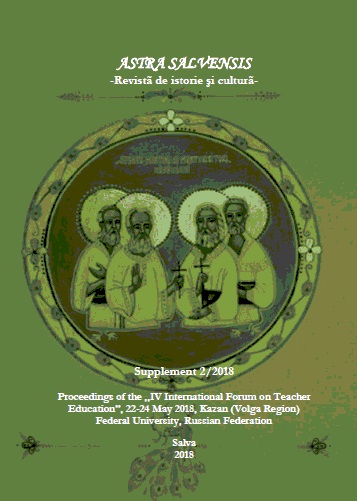ARTS AS A PEDAGOGICAL APPROACH TO PREVENTING AND OVERCOMING CHILDREN‟S BEHAVIORAL PROBLEMS
ARTS AS A PEDAGOGICAL APPROACH TO PREVENTING AND OVERCOMING CHILDREN‟S BEHAVIORAL PROBLEMS
Author(s): Christiana D. AfrikanerSubject(s): Social Sciences, Fine Arts / Performing Arts
Published by: Asociaţiunea Transilvană pentru Literatura Română şi Cultura Poporului Român - ASTRA
Keywords: arts; behavioral problems; music; dance; visual art;
Summary/Abstract: Teachers are challenged by schoolchildren with behavioural problems. It is profound that children are disposed to numerous forms of behavioural problems at school. These behavioural disputes in children can have severe implications if not prevented and overcome during childhood. The paper aims to determine the contributing factors of children‘s problems and educators‘ interpretation of them, to identify the most common, disruptive, and unacceptable learners‘ problem behaviours from teachers and peers‘ perspective. The research looks into approaches to preventing and overcoming behavioural problems. Behavioural problems were investigated using a random sampling of learners from primary and secondary schools in Walvis Bay, Erongo Region, Namibia. Self-administered questionnaires were developed for pupils and teachers respectively. The questionnaires aimed to determine the types and frequency of challenging classroom behaviours. Practical involvement of children with behavioural problems in arts activities was held during and after school programs. Individual interviews with Life Skills teachers and randomly selected pupils and parents were conducted. Children with behavioural problems were referred to the Gabzella Performers, music and dance groups. Groups are formed to accommodate children from various schools to keep them off the streets. Those not interested in performing arts were referred to the visual art club. A total of 30 subjects completed the questionnaires. The majority of the pupils with behavioural disorders are from secondary schools. The results revealed most common behaviour problems which are disobedience and disrespect to teachers, disruptive behaviour during lessons, intentionally obstructing other children, talking out of turn, verbal aggression, truancy, homework not done, inattentiveness, late coming, pugnacity and rudeness, bullying, lying and stealing. Findings showed that the teachers collectively agreed they spent too much time on problems of order and control which was a waste of time. The pupils supported teachers‘ findings as valid reasons for behavioural problems. After attending the Express Yourself Club and Gabzella practices, the children showed a significant reduction in behavioural problems in school and at home. This study revealed that schoolchildren exhibit several forms of behavioural problems, which can be prevented and overcome through arts activities. The research results show that arts education can serve as a beneficial tool used to assist schoolchildren with disruptive behaviour. The arts are what make children utmost human and most complete as people as it transforms them into critical observers of the world. The arts help children discover parts of themselves that have previously gone unspoken and allow them to behave in an acceptable way in the school and the community. The arts provide a way for children to communicate and overcome complex feelings, fears and struggles when teachers and parents‘ words alone are not enough. Recommendations are made that research on the arts as a way of treatment for children with behavioural problems are developed and expanded. It is essential to identify difficulties that children experience at the beginning stage to provide necessary assistance and involve them in arts activities.
Journal: Astra Salvensis - revista de istorie si cultura
- Issue Year: VI/2018
- Issue No: Supp 2
- Page Range: 534-551
- Page Count: 18
- Language: English

